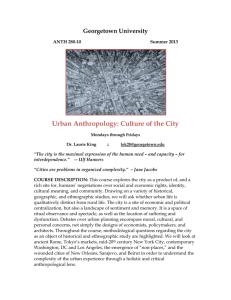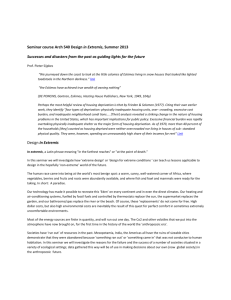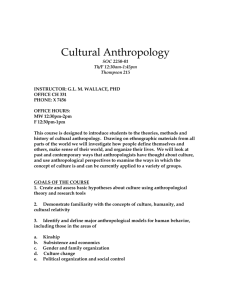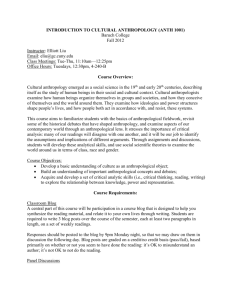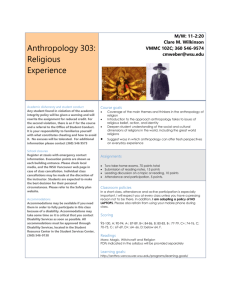readings - Anthropology at the University of Florida
advertisement
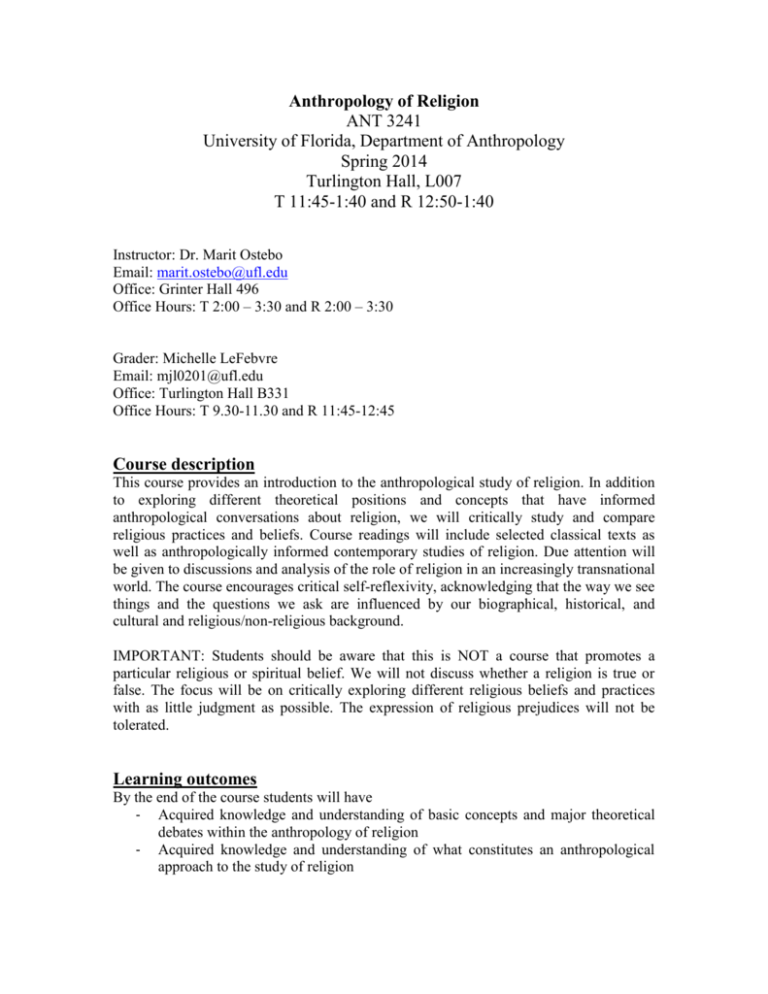
Anthropology of Religion ANT 3241 University of Florida, Department of Anthropology Spring 2014 Turlington Hall, L007 T 11:45-1:40 and R 12:50-1:40 Instructor: Dr. Marit Ostebo Email: marit.ostebo@ufl.edu Office: Grinter Hall 496 Office Hours: T 2:00 – 3:30 and R 2:00 – 3:30 Grader: Michelle LeFebvre Email: mjl0201@ufl.edu Office: Turlington Hall B331 Office Hours: T 9.30-11.30 and R 11:45-12:45 Course description This course provides an introduction to the anthropological study of religion. In addition to exploring different theoretical positions and concepts that have informed anthropological conversations about religion, we will critically study and compare religious practices and beliefs. Course readings will include selected classical texts as well as anthropologically informed contemporary studies of religion. Due attention will be given to discussions and analysis of the role of religion in an increasingly transnational world. The course encourages critical self-reflexivity, acknowledging that the way we see things and the questions we ask are influenced by our biographical, historical, and cultural and religious/non-religious background. IMPORTANT: Students should be aware that this is NOT a course that promotes a particular religious or spiritual belief. We will not discuss whether a religion is true or false. The focus will be on critically exploring different religious beliefs and practices with as little judgment as possible. The expression of religious prejudices will not be tolerated. Learning outcomes By the end of the course students will have - Acquired knowledge and understanding of basic concepts and major theoretical debates within the anthropology of religion - Acquired knowledge and understanding of what constitutes an anthropological approach to the study of religion - Developed the ability to critically analyze and discuss religious practices and beliefs using theoretical terms and approaches developed within the anthropology of religion Developed an understanding of self-reflexivity as key to anthropological studies in general and to the study of religion from an anthropological perspective in particular Required text Bowen, John R. (2014). Religions in Practice. An Approach to the Anthropology of Religion (6th Edition) PDF files of other required readings are available at the course e-learning website (Sakai). Class requirements and assignments All assignments (except for the in-class quizzes) are announced well in advance, and cannot be made up for unless the absence is excusable. For information on excusable absence see https://catalog.ufl.edu/ugrad/current/regulations/info/attendance.aspx In the case of excusable absence the student must notify the instructor prior to the missed class or assignment AND provide a doctor’s note or note from the proper University authorities. 5 in-class Quizzes (10 % of course grade) 5 in-class unannounced quizzes will be given throughout the semester. In addition to assess students’ comprehension of the course topics, the quizzes will serve as a proof of attendance. Make-up missed quizzes will only be allowed if the student have notified the instructor in advance AND if the absence is excusable. Response papers (30 % of course grade) The objective of these papers is to engage the students in critical, in-depth reading and reflection of course readings (including films). It is expected that the students draw on theories and concepts that have been introduced in the course readings, lectures and class discussions and that they articulate their own informed and analytical responses. The response papers should include proper reference to at least two texts/articles (excluding the article/film the students are responding to, see class schedule). Reference texts could either be course readings or other relevant articles selected by the individual student. Students, who use and critically engage with texts or articles that are not part of the course readings, will have the opportunity to receive extra credit (see below). Students should use the American Anthropological Association citation style: http://www.aaanet.org/publications/style_guide.pdf The format for the response papers is 1.5 line space / font size 12. The papers should each be three pages in length. Papers must be uploaded to Sakai in .doc or .docx form, with no spaces in the file name, before class on the due date. Plagiarism of any sort will not be tolerated and the response papers may be subject to control through Turnitin. Please note that acts of plagiarism include: Turning in a paper or assignment that was written by someone else. Copying verbatim a sentence or paragraph of text from the work of another author without proper citation and quotation marks Paraphrasing or restating in your own words, text or ideas written by someone else without proper citation. Midterm (24 % of course grade) The midterm will cover materials from the first half of the course, including readings, lectures, class discussions, videos and on-line materials. Exams will be administered in class during regularly scheduled class time. Makeup exams will only be possible in cases of excusable absences (see above). In such cases, you must contact the instructor with written documentation from an appropriate authority at least 24 hours before the exam. Final (36 % of course grade) The final exam will be cumulative. It can potentially include material covered in lectures, class discussions, readings, videos and online materials. Requirements as described above for the midterm apply. Extra credit Total available extra credit is 5 %. More information about extra credit will be given in class. Gradebook overview ASSIGNMENT Attendance Pop quiz 1 Pop quiz 2 Pop quiz 3 Pop quiz 4 Pop quiz 5 Response papers Response paper 1 Response paper 2 Exams Midterm Final Extra credit Self-selected references Project 1 Project 2 % OF COURSE GRADE 10 2 2 2 2 2 30 7.5 22.5 60 24 36 +5 +1.67 +1.67 +1.67 % OF CATEGORY 100/100 20 20 20 20 20 100/100 25 75 100/100 40 60 100/100 +33.33 +33.33 +33.33 Grading scale GRADE A TOT % 94100 A8893 B+ 8287 B 7681 B7175 C+ 6670 C 6165 C5660 D+ 5155 D 4650 D4045 E <40 UF Policies Academic Honesty: When students enroll at UF they commit themselves to honesty and integrity. As a result of completing the registration form at the University of Florida, every student has signed the following statement: “I understand the University of Florida expects its students to be honest in all their academic work. I agree to adhere to this commitment to academic honesty and understand that my failure to comply with this commitment may result in disciplinary action up to and including expulsion from the University.” On work submitted for credit by UF students, the following pledge is either required or implied: “On my honor, I have neither given nor received unauthorized aid in doing this assignment.” Campus Helping Resources: Students experiencing crisis or personal problems that interfere with their general wellbeing are encouraged to utilize the university’s counseling resources. The UF Counseling and Wellness Center provides confidential counseling services at no cost for currently enrolled students. 1. Counseling and Wellness Center, http://www.counseling.ufl.edu/cwc/ 2. Student Health Care Center: http://shcc.ufl.edu/ For an overview of various resources see http://www.distance.ufl.edu/getting-help Disabilities: Students with disabilities requesting accommodations should first register with the Disability Resource Center (352-392-8565, www.dso.ufl.edu/drc/) by providing appropriate documentation. Once registered, students will receive an accommodation letter, which must be presented to the instructor when requesting accommodation. Students with disabilities should follow this procedure as early as possible in the semester. Technical assistance: For issues with technical difficulties for E-learning in Sakai, please contact the UF Help Desk at: ● Learning-support@ufl.edu ● (352) 392-HELP - select option 2 ● https://lss.at.ufl.edu/help.shtml Class schedule (Note: The instructor reserves the right to modify the course schedule. However, no changes will be made to the exam schedule and the assignment due dates.) Week 1 (Jan 6-10) Introduction READINGS Tuesday Course overview Thursday Chapter 1 in Bowen (p 1-10) Bowie, F. (2008) Anthropology of Religion Wagner, M. B. (1999) The Study of Religion in American Society Week 2 (Jan 13-17) Theoretical perspectives on religion READINGS Tuesday Chapter 2 in Bowen (p 11-31) Geertz, C. (1973) Religion as a Cultural System (chapter 4 in The Interpretation of Cultures) Thursday Asad, T. (1993 [1982}) The Construction of Religion as an anthropological category Week 3 (Jan 20-24) Domains and Boundaries of Religion READINGS Tuesday Chapter 3 in Bowen (p 33-47) FILM: Religions of the World: Shinto (available as a VHS in the library course reserve and also possible to watch, in four parts, on you-tube Thursday Adrian, M. (2009) France, the veil and Religious Freedom Gunn, T.J. (2004) Under God but Not the Scarf: The Founding Myths of Relgious Freedom in the United States and Laicite in France Week 4 (Jan 27 – 31) Symbolism, worldview and myth READINGS Tuesday Ortner, S. (1973) On Key Symbols Winzeler, R. L. (2012) Natural symbols (chapter 5 in Anthropology of Religion – what we know, think and question) Wolf, E. R. (1958) The Virgin of Guadalupe: A Mexican National Symbol Thursday The structural study of myth (Levi-Strauss, 1955) Beattie, J. (1960) Nyoro Myth ASSIGNMENT: Response paper # 1 due January 31. Text: Under God but Not the Scarf: The Founding Myths of Relgious Freedom in the United States and Laicite in France Week 5 (Feb 3-7) Rituals of Transitions READINGS Tuesday Chapter 4 in Bowen (p 48-68) Movie: Inside Mecca (National Geographic) Thursday Powers, M. N. (1980) Menstruation and Reproduction. An Oglala Case Week 6 (Feb 10-14) Healing and illness READINGS Tuesday Chapter 5 in Bowen Foster, G. M. (1976) Disease Etiologies in Non-Western Medical Systems Csordas, T. J. (1988) Elements of Charismatic Persuasion and Healing Thursday Vecchiato, N. L. (1993) Ilness, therapy and change in Ethiopian Possession Cults DEADLINE FOR EXTRA CREDIT PROJECT NO 1: FEBRUARY 14 Week 7 (Feb 17-21) Sorcery, witchcraft and magic READINGS: Tuesday: Chapter 6 in Bowen; Boddy, J. (1988) Spirits and Selves in Northern Sudan: The Cultural Therapeutics of Possession and Trance Thursday: Thomas, F. (2007) “Our Families are Killing us”: HIV/AIDS, Witchcraft and Social Tensions in Namibia Gmelch, G. (1971) Baseball magic Week 8 (Feb 24-28) Worship, Hierarchy, Conflict: Focus on Hinduism READINGS Tuesday: Chapter 7 in Bowen Review for mid-term exam Thursday: Mid-term exam SPRINGBREAK (March 3-7) Week 9 (March 10-14) Gender and Religion READINGS Tuesday Abu-Lughod, L. (2002) Do Muslim women really need saving? Hodgson, D. (1999) Engendered Encounters: Men of the Church and the “Church of Women” in Maasailand, 1950-1993 Thursday Fader, A. (2007) Reclaiming sacred sparks. Linguistic syncretism and Gendered language shift among Hasidic Jews in New York Week 10 (March 17-21) Sacred speech, messages and prayer READINGS: Tuesday Chapter 11 and 13 in Bowen May, L. C. (1956) A survey of Glossolalia and Related Phenomena in Non-Christian Religions Thursday Shapiro, J. (1987) From Tupa to the Land without Evil. The Christianization of TupiGuarani Cosmology Week 11 (March 24-28) Religious boundaries and identities READINGS: Tuesday Chapter 10 in Bowen Film: Live and become Thursday: Live and become cont. Week 12 (March 31 – April 4) Religion and globalization READINGS: Tuesday: Chapter 9 in Bowen (p 129-140), Savishinsky, N. J. (1994) Rastafari in the Promised land. The Spread of a Jamaican Socioreligious Movement among the Youth of West Africa Thursday: Jacka, J. K. (2005) Emplacement and Millennial expectations in an era of development and globalization ASSIGNMENT: Response paper #2 due April 4. Film: Live and become Week 13 (April 7 – 11) Religion and globalization READINGS: Tuesday: Chapter 14 in Bowen, Redefining the Boundaries of Belonging. The institutional Character of Transnational Religious Life (Levitt, 2004) Thursday: The Globalization of Pentecostal and Charismatic Christianity (Robbins, 2004) Altglas, V. (2007) The Global Diffusion and Westernization of Neo-Hindu Movements. Siddha Yoga and Sivandanda Centres Week 14 (April 14 – 18) Religion, social justice and change READINGS: Tuesday: Religious Literacy in the Faith-Based Prison (Erzen, 2008) Thursday: Clarke, G. (2007) Agents of Transformation? Donors, faith-based organizations and International development Ver Beek, K. J. (2000) Spirituality: A development taboo Week 15 (April 21 - 25) Course Conclusion and review Tuesday: Exam review Thursday: Reading day Week 16: Exam COMPLETE REFERENCE LIST Abu-Lughod, L. (2002) 'Do Muslim Women Really Need Saving? Anthropological Reflections on Cultural Relativism and Its Others', American Anthropologist, 104(3): 783-790. Adrian, M. (2009) 'France, the Veil and Religious Freedom', Religion, State and Society, 37(4): 345-374. Asad, T. (1993 [1982}) 'The Construction of Religion as an anthropological category ', in Baltimore, M. (ed) Genealogies of Religion; Discipline alld Reasons of Power in Christianity and Islam. Johns Hopkins University Press. Beattie, J. (1960) 'Nyoro Myth', in Beattie, J. (ed). Boddy, J. (1988) 'Spirits and selves in Northern Sudan: the cultural therapeutics of possession and trance', American Ethnologist, 15(1): 4-27. Bowie, F. (2008) 'Anthropology of Religion', Religion Compass, 2(5): 862-874. Clarke, G. (2007) 'Agents of Transformation? Donors, Faith-Based Organisations and International Development', Third World Quarterly, 28(1): 77-96. Csordas, T. J. (1988) 'Elements of Charismatic Persuasion and Healing', Medical Anthropology Quarterly, 2(2): 121-142. Fader, A. (2007) 'Reclaiming Sacred Sparks: Linguistic Syncretism and Gendered Language Shift among Hasidic Jews in New York', Journal of Linguistic Anthropology, 17(1): 1-22. Foster, G. M. (1976) 'Disease Etiologies in Non-Western Medical Systems', American Anthropologist, 78(4): 773-782. Geertz, C. (1973) The Interpretation of Cultures, New York: Basic Books. Gmelch, G. (1971) 'Baseball Magic', Transaction, 8(8): 39-41. Gunn, T. J. (2004) 'Under God but Not the Scarf: The Founding Myths of Relgiious Freedom in the United States and Laicite in France', Journal of State and Church, (7). Hodgson, D. L. (1999) 'Engendered Encounters: Men of the Church and the “Church of Women” in Maasailand, Tanzania, 1950–1993', Comparative Studies in Society and History, 41(04): 758-783. Jacka, J. K. (2005) 'Emplacement and Millennial Expectations in an Era of Development and Globalization: Heaven and the Appeal of Christianity for the Ipili', American Anthropologist, 107(4): 643-653. May, L. C. (1956) 'A Survey of Glossolalia and Related Phenomena in Non-Christian Religions', American Anthropologist, 58(1): 75-96. Ortner, S. B. (1973) 'On Key Symbols1', American Anthropologist, 75(5): 1338-1346. Powers, M. N. (1980) 'Menstruation and Reproduction: An Oglala Case', Signs, 6(1): 54-65. Savishinsky, N. J. (1994) 'Rastafari in the Promised Land: The Spread of a Jamaican Socioreligious Movement among the Youth of West Africa', African Studies Review, 37(3): 19-50. Shapiro, J. (1987) 'from Tupã to the land without evil: the Christianization of TupiGuarani cosmology', American Ethnologist, 14(1): 126-139. Thomas, F. (2007) '‘Our Families are Killing Us’: HIV/AIDS, Witchcraft and Social Tensions in the Caprivi Region, Namibia', Anthropology & Medicine, 14(3): 279-291. Vecchiato, N. L. (1993) 'Illness, therapy, and change in Ethiopian possession cults', Africa, 63(02): 176-196. Ver Beek, K. A. (2000) 'Spirituality: A development taboo', Development in Practice, 10(1): 31-43. Wagner, M. B. (1999) 'The Study of Religion in American Society', in Glazier, S. D. (ed) Anthropology of Religion: A Handbook. Westport, Conn., Greenwood Press. Winzeler, R. L. (2012) 'Natural Symbols', in Winzeler, R. L. (ed) Anthropology of Religion - what we know, think and question. Lanham, New York, Altamira Press. Wolf, E. R. (1958) 'The Virgin of Guadalupe: A Mexican National Symbol', Journal of American Folklore, 71(279).
